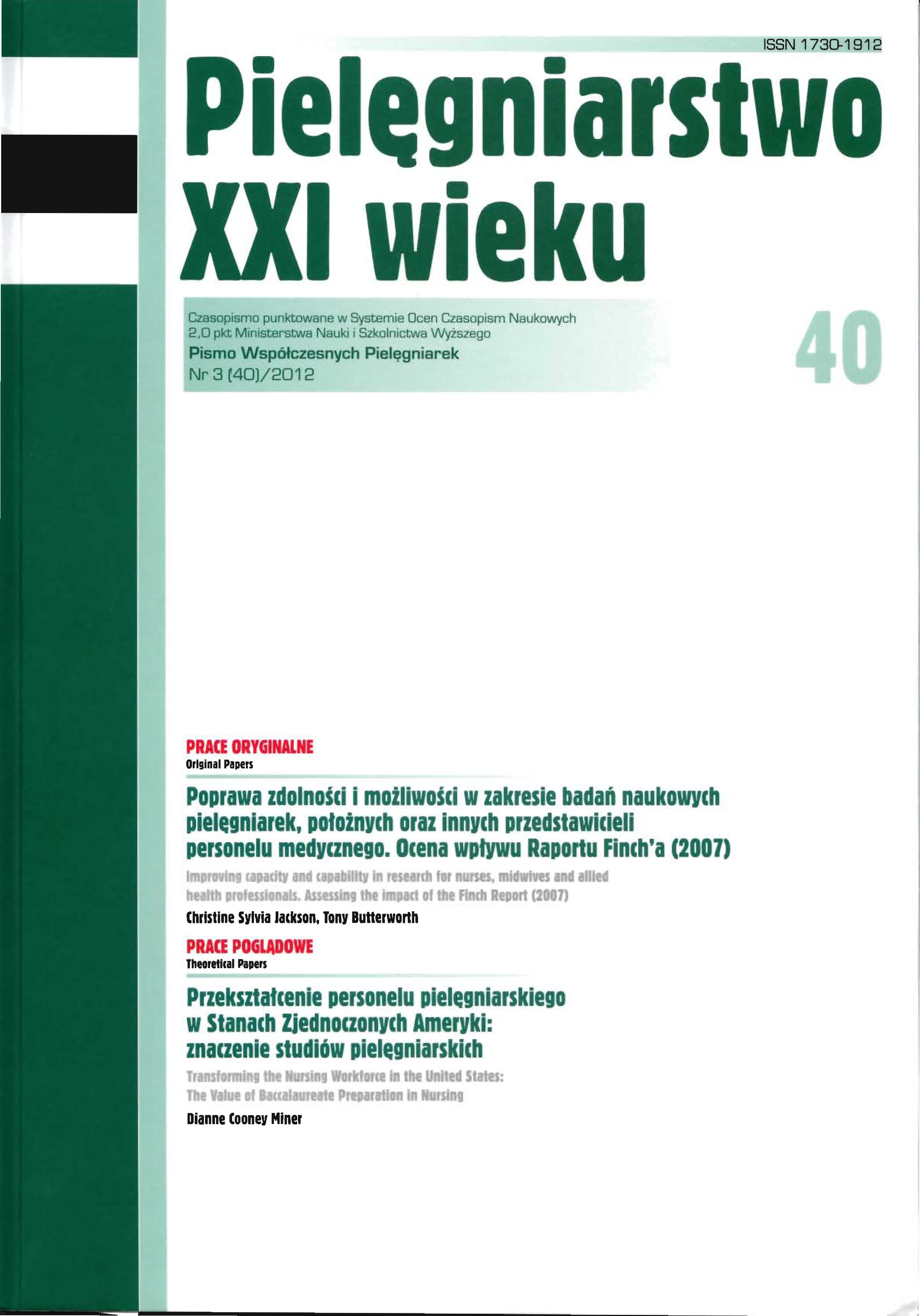Effectiveness of nursing clinical mentors
Keywords:
nursing clinical mentor, student, evaluationAbstract
EFFECTIVENESS OF NURSING CLINICAL MENTORS
Aim. To explore effectiveness of nursing clinical mentors.
Material and methods. The subjects were 56 third-year students of Nursing of undergraduate studies and 17 of their clinical mentors from J.J. Strossmayer University of Osijek, Faculty of Medicine Osijek. The research was conducted at Clinical Hospital Centre Osijek, Department of Surgery, divided in two parts.
The first part (prior to clinical practice) examined students’ expectations of effective nursing clinical mentors. The second part (after completing clinical practice) examined and compared evaluations and self-evaluations of mentor effectiveness. The research instrument was a questionnaire containing six categories (52 criteria) for assessment of effective nursing clinical mentors taken from The Nursing Clinical Teacher Effectiveness Inventory (Mogan & Knox) and Observations of Nursing Teachers in Clinical Settings (Mogan & Warbinek). Numerical data were described using basic mean and dispersion measures. For exploring differences between three independent groups Kruskal Wallis test was used and Mann-Whitney test was used to compare two groups. The obtained data were analysed statistically at a significance level of α=0.05.
Results. The most desirable mentor qualities, expected by students, are correcting student mistakes without belittling, being well-organized and providing clear explanations. Least important are: enthusiasm, adapting instructions to students’ level of competence, discussing new developments in the area they are covering. Mentor self-evaluation was significantly higher compared to students’ expectations and students’ evaluation of mentors’ effectiveness (p<0.001). There are no significant differences between expectations and evaluation within categories, although, they are present within more than half of criteria students marked important: correcting students’ mistakes without belittling (p=0.001), being well- organized (p=0.039) and providing clear explanations (p=<0.001).
Conclusions. Continuous monitoring and evaluation of mentoring process is a key factor for better quality of professional education and advancement of nurses.
References
1. Gopee N. Mentoring and Supervision in Healthcare. Sage Publication Ltd. 2007;3:36.
2. The Royal College of Nursing. Guidance for mentors of nursing students and midwives. Second edition, London. 2009;2.
3. Kube ML. Clinical Teaching Behaviours - The Relationship of Nursing Faculty Clinical Teaching Behaviours to Student Learning. College of Saint Mary 2010; Dissertation.
4. Knox JE, Mogan J. Important clinical teacher behaviours as perceived by university nursing faculty, students and graduates. J. Adv. Nurs. 1985;10:25-30.
5. Ali PA, Panther W. Professional development and the role of mentorship. Nursing Standard. 2008;22(42):35-39.
6. Aston L, Hallam PA. Successful Mentoring in Nursing. Learning Matters 33 Southernhay East Exeter, 2010.
7. Rehan S, Barolia R. Characteristics of Clinical faculty perceived By nursing students and Alumni in Karachi. Canadian Journal of Pure and Applied Sciences. 2007;1(1) 35-44.
8. Berk RA, Berg J, Mortimer R, Walton-Moss B, Yeo TP. Measuring the Effectiveness of Faculty Mentoring Relationships, Acad Med. 2005; 80:66–71.
9. Li MK. Perceptions of effective clinical teaching behaviours in a hospital-based nurse training programme. Journal of Advanced Nursing. 1997; 26:1252-1261.
10. Sellick K, Kanitsaki O. A comparison of faculty and student perceptions of clinical nurse teacher behaviours. Journal of Advanced Nursing. 1991;9:3-7
11. Gignac-Caille AM, Oermann MH. Student and faculty perceptions of effective clinical instruction in ADN programs. Journal of Nursing Education, 2001;95:347-353.
12. Lee W, Cholowski K, Williams AK. Nursing students and clinical educators perceptions of characteristics of effective clinical educators in an Australian university school of nursing. Journal of Advanced Nursing. 2002;39:412-420.
13. Kelly C. Students perceptions of effective clinical teaching revisited. Nurse Education Today. 2007;27:885-892.
14. OShea HS, Parsons MK. Clinical instruction: Effective & ineffective teacher behaviors. Nursing Outlook.1979;27:411-415.
15. Nehring V. Nursing clinical teacher effectiveness inventory: A replication study of the characteristics of „best‟ and „worst‟ clinical teachers as perceived by nursing faculty and students. Journal of Advanced Nursing.1990;15:934-940.
16. Brown ST. Faculty & student perception of effective clinical teachers. Journal of Nursing Education.1981;20:4-15.
17. Bergman K, Gaitskill T. Faculty & student perceptions of effective clinical teachers: An extension study. Journal of Professional Nursing, 1990;6:33-44.
18. Gillespie M. Student-teacher connection in clinical nursing education. Journal of Advanced Nursing. 2002;37:566-576.
19. Jackson R. Approaching clinical teaching and evaluation through the written word. A humanistic approach. Journal of Nursing Education. 1987;26:384-385.
20. Kirshling JM, Fields J, Imle M et al. Evaluating teaching effectiveness. Journal of Nursing Education. 1995;34:401-410.
21. Lofmark A, Wikblad K. Facilitating and obstructing factors for development of learning in clinical practice: A student perspective. Journal of Advanced Nursing. 2001;34:43-50.
22. Reeve MM. Development of an instrument to measure effectiveness of clinical instructors. Journal of Nursing Education.1994;33:15-20.
23. Viverais-Dresler G, Kutschke M. RN Students ratings and opinions related to the importance of certain clinical teacher behaviours. Journal of Continuing Education in Nursing. 2001;32:274-282.
24. Kotzabassaki S, Panou M, Dimou F et al. Nursing students & facultys perceptions of the characteristics of „best“ and „worst“ clinical teachers: A replication study. Journal of Advanced Nursing. 1997;26:817-824.
25. Seith S, Bell SK. Perceptions of effective clinical teaching in associate degree programs. Journal of Nursing Education.1994;33:389-394.
26. Mogan J, Knox JE. Characteristics of „best“ and „worst“ clinical teachers as perceived by university nursing faculty and students. Journal of Advanced Nursing. 1987;12: 331-337.
Downloads
Published
Issue
Section
License
Copyright (c) 2012 Robert Lovrić, Nada Prlić, Ivana Barać, Jadranka Plužarić (Autor)

This work is licensed under a Creative Commons Attribution 4.0 International License.




